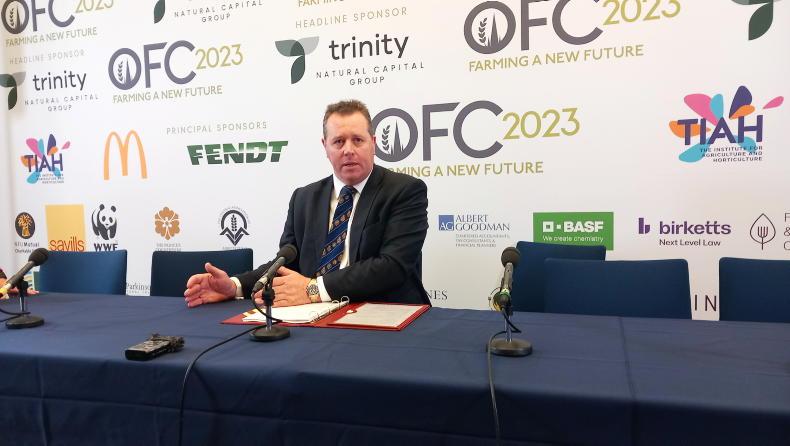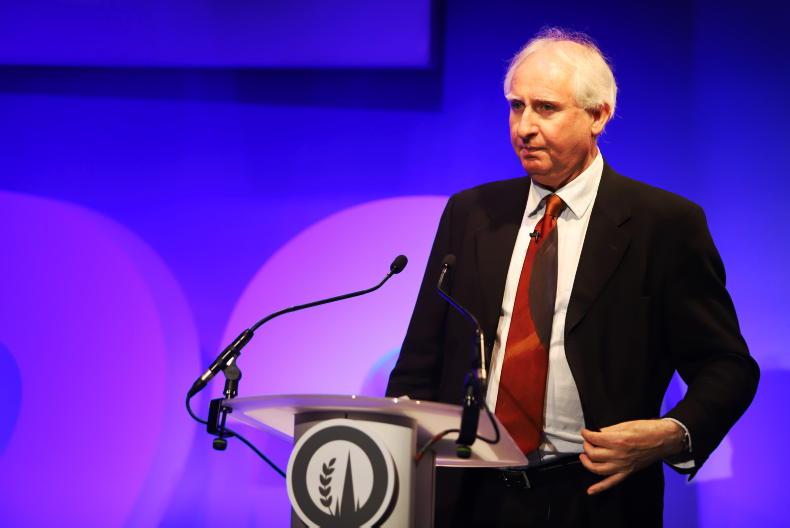The UK government is not concerned about area-based farm payments being retained in devolved regions of the UK, even though they are being phased out in England.
Speaking to reporters in Oxford last week, Farming Minister Mark Spencer compared differences in agricultural policy across the UK to long-standing suckler headage payments which are available in Scotland.
“We have not had that in England for a long time, but I have never heard the argument that English beef farmers are worse off than Scottish ones,” he said.
At present, the plan is for NI, Scotland, and Wales to keep some level of area-based payment as part of their post-Brexit agricultural policies. In England, direct payments will be phased out by 2027 and replaced with schemes mainly focused on environmental measures.
Spencer also indicated policymakers in London are reluctant to make changes to NI farm support schemes in the absence of a functioning Executive at Stormont.
The Conservative Party MP said UK government officials are in constant communication with DAERA, but he suggested Westminster would not be used to pass legislation on new farm schemes for NI.
“I hope the issues can be resolved as soon as possible so Stormont is up and running. It definitely helps those conversations [on agricultural policy] when you can make decisions,” he said.
English payment
A key talking point at the Oxford Farming Conference was an extra “management payment” which is being added to the new Sustainable Farming Incentive (SFI) scheme in England.
The additional incentive payment will be worth up to £1,000 for each farm and will be calculated as £20/ha over a claimant’s first 50ha.

Farming Minister Mark Spencer speaking to reporters at the Oxford Farming Conference.
One of the major criticisms of England’s new agricultural policy has been inadequate payment rates and there are widespread concerns that there will be poor uptake among farmers as a result.
For example, with the improved grassland soil standard under SFI, a total annual payment of £11/acre is paid under the introductory level and £23/acre is available under the intermediate level.
“Now is the moment for those farmers to go and have a fresh look at this. There could be something in it for you,” Spencer said.
Lukewarm response
News of the extra SFI money, as well as payment increases under the English environmental scheme Countryside Stewardship, were met with a lukewarm response from the National Farmers’ Union (NFU).
David Exwood, the NFU’s vice-president, said there was a risk that the latest announcements would be “too little, too late” for English farmers.
“It’s a sad reflection of the scheme’s progress and development that NFU members know more about what they will lose in direct payments than what they will gain from taking part in these new schemes,” he said.
Agricultural payments must focus on public goods
Future payments to UK
farmers must be focused on delivering “public goods” to justify the use of taxpayers’ money, a leading academic has argued.
Sir Charles Godfray from the University of Oxford said the £3bn that was paid to UK farmers under the EU’s Common Agricultural Policy (CAP) has become “very vulnerable” since Brexit.
“We need arguments that will stack up with the hard economists in the Treasury. If you are arguing for the retention of that £3bn, public money for public goods is an absolutely strong way of doing it,” he said.

The Irish Farmers Journal sponsored two Young Farmers' Clubs of Ulster (YFCU) members to attend last week’s Oxford Farming Conference in England. Pictured at the event are Mitchell Park from Glarryford, Peter McCann from the Irish Farmers Journal, and Phil Donaldson from Donaghadee.
Godfray said the definition of a public good was still up for debate and he suggested it could mean more than just delivering environmental outcomes. “Food security is potentially a public good, but that doesn’t mean production subsidies,” he said.
Instead, he said arguments on improving food security must be made in “a sophisticated way” that are focused on addressing “market failings” so that the UK food system becomes more resilient.
He suggested that CAP payments had “papered over” unfairness in supply chains as farmers still stayed in business even though they did not receive adequate prices for their produce.
Trade
Godfray also predicts that international trade will become much more focussed on greenhouse gas emissions within the next decade and policies such as the EU’s carbon border adjustment tax will be “a big geopolitical issue”.
“There is a strong argument to make that if meat produced here is substituting meat that is produced somewhere else but is less carbon efficient, then that is good,” he said.
Farms must be more productive
to feed the planet, says US official
It is essential that farms across the world produce more food with less inputs over the
coming decades, a top official from the United States Department of Agriculture (USDA) has said.
“To feed the planet in the year 2050 under the current productivity levels of the world’s farmers will entail elimination of nearly all the remaining forest on the planet. This really highlights the importance of increasing our productivity,” said Jason Hafemeister.
International trade
In his address at Oxford, the USDA official argued that international trade was important for giving farmers access to larger markets which should encourage productivity.
Hafemeister also appeared to challenge an argument often made by UK farm and environmental groups that food should not be imported if is produced in ways that would be illegal here.
“We are very much concerned about one-size-fits-all cookie cutter approaches and mirror clauses that say ‘if you want to sell into our market then you have got to produce like us,’” he said.
Labour vows to be more farmer friendly
The Labour Party has vowed to implement policies that will be more supportive of UK farmers if it wins the next general election.
Shadow farming minister Daniel Zeichner described international trade deals that the Tory government have negotiated since Brexit as “the elephant in the room”.

Labour MP and shadow farming minister Daniel Zeichner.
“There’s a lot to be learned about how we could do it better in the future, particularly in terms of the food and agriculture sector,” the Labour MP said at last week’s Oxford Farming Conference.
Food production
Zeichner said a future Labour government will be more active in supporting domestic food production.
“In my view, the [Conservative’s] plan seems to be that there isn’t a plan. The plan is that they want to leave it to the market. We think food security matters, which means we will be a government that is willing to tackle market failures and imbalances of power,” he said.
Labour has also committed to making it mandatory for public bodies, such as hospitals and prisons, to buy at least 50% of their food locally.
Private money needed to
restore nature
Farmers and landowners will need to receive private finance from businesses to fund improvements to nature, the head of a conservation charity has said.
Beccy Speight from the Royal Society for the Protection of Birds (RSPB) told delegates at Oxford that public money from government will not be enough to address issues with biodiversity and climate change.
“The funding gap over the next 10 years for the amount of restoration that we have said we need to do for nature is about £50bn,” she said.
Delegates were told this could lead to opportunities for additional income, where the principles of “natural capital” and “nature-based solutions” allow landowners to receive money for improving the environment. “One of the big risks is that this marketplace is full of cowboys that claim to deliver this stuff but it’s not doing what we want it to do,” Speight acknowledged.
The UK government is not concerned about area-based farm payments being retained in devolved regions of the UK, even though they are being phased out in England.
Speaking to reporters in Oxford last week, Farming Minister Mark Spencer compared differences in agricultural policy across the UK to long-standing suckler headage payments which are available in Scotland.
“We have not had that in England for a long time, but I have never heard the argument that English beef farmers are worse off than Scottish ones,” he said.
At present, the plan is for NI, Scotland, and Wales to keep some level of area-based payment as part of their post-Brexit agricultural policies. In England, direct payments will be phased out by 2027 and replaced with schemes mainly focused on environmental measures.
Spencer also indicated policymakers in London are reluctant to make changes to NI farm support schemes in the absence of a functioning Executive at Stormont.
The Conservative Party MP said UK government officials are in constant communication with DAERA, but he suggested Westminster would not be used to pass legislation on new farm schemes for NI.
“I hope the issues can be resolved as soon as possible so Stormont is up and running. It definitely helps those conversations [on agricultural policy] when you can make decisions,” he said.
English payment
A key talking point at the Oxford Farming Conference was an extra “management payment” which is being added to the new Sustainable Farming Incentive (SFI) scheme in England.
The additional incentive payment will be worth up to £1,000 for each farm and will be calculated as £20/ha over a claimant’s first 50ha.

Farming Minister Mark Spencer speaking to reporters at the Oxford Farming Conference.
One of the major criticisms of England’s new agricultural policy has been inadequate payment rates and there are widespread concerns that there will be poor uptake among farmers as a result.
For example, with the improved grassland soil standard under SFI, a total annual payment of £11/acre is paid under the introductory level and £23/acre is available under the intermediate level.
“Now is the moment for those farmers to go and have a fresh look at this. There could be something in it for you,” Spencer said.
Lukewarm response
News of the extra SFI money, as well as payment increases under the English environmental scheme Countryside Stewardship, were met with a lukewarm response from the National Farmers’ Union (NFU).
David Exwood, the NFU’s vice-president, said there was a risk that the latest announcements would be “too little, too late” for English farmers.
“It’s a sad reflection of the scheme’s progress and development that NFU members know more about what they will lose in direct payments than what they will gain from taking part in these new schemes,” he said.
Agricultural payments must focus on public goods
Future payments to UK
farmers must be focused on delivering “public goods” to justify the use of taxpayers’ money, a leading academic has argued.
Sir Charles Godfray from the University of Oxford said the £3bn that was paid to UK farmers under the EU’s Common Agricultural Policy (CAP) has become “very vulnerable” since Brexit.
“We need arguments that will stack up with the hard economists in the Treasury. If you are arguing for the retention of that £3bn, public money for public goods is an absolutely strong way of doing it,” he said.

The Irish Farmers Journal sponsored two Young Farmers' Clubs of Ulster (YFCU) members to attend last week’s Oxford Farming Conference in England. Pictured at the event are Mitchell Park from Glarryford, Peter McCann from the Irish Farmers Journal, and Phil Donaldson from Donaghadee.
Godfray said the definition of a public good was still up for debate and he suggested it could mean more than just delivering environmental outcomes. “Food security is potentially a public good, but that doesn’t mean production subsidies,” he said.
Instead, he said arguments on improving food security must be made in “a sophisticated way” that are focused on addressing “market failings” so that the UK food system becomes more resilient.
He suggested that CAP payments had “papered over” unfairness in supply chains as farmers still stayed in business even though they did not receive adequate prices for their produce.
Trade
Godfray also predicts that international trade will become much more focussed on greenhouse gas emissions within the next decade and policies such as the EU’s carbon border adjustment tax will be “a big geopolitical issue”.
“There is a strong argument to make that if meat produced here is substituting meat that is produced somewhere else but is less carbon efficient, then that is good,” he said.
Farms must be more productive
to feed the planet, says US official
It is essential that farms across the world produce more food with less inputs over the
coming decades, a top official from the United States Department of Agriculture (USDA) has said.
“To feed the planet in the year 2050 under the current productivity levels of the world’s farmers will entail elimination of nearly all the remaining forest on the planet. This really highlights the importance of increasing our productivity,” said Jason Hafemeister.
International trade
In his address at Oxford, the USDA official argued that international trade was important for giving farmers access to larger markets which should encourage productivity.
Hafemeister also appeared to challenge an argument often made by UK farm and environmental groups that food should not be imported if is produced in ways that would be illegal here.
“We are very much concerned about one-size-fits-all cookie cutter approaches and mirror clauses that say ‘if you want to sell into our market then you have got to produce like us,’” he said.
Labour vows to be more farmer friendly
The Labour Party has vowed to implement policies that will be more supportive of UK farmers if it wins the next general election.
Shadow farming minister Daniel Zeichner described international trade deals that the Tory government have negotiated since Brexit as “the elephant in the room”.

Labour MP and shadow farming minister Daniel Zeichner.
“There’s a lot to be learned about how we could do it better in the future, particularly in terms of the food and agriculture sector,” the Labour MP said at last week’s Oxford Farming Conference.
Food production
Zeichner said a future Labour government will be more active in supporting domestic food production.
“In my view, the [Conservative’s] plan seems to be that there isn’t a plan. The plan is that they want to leave it to the market. We think food security matters, which means we will be a government that is willing to tackle market failures and imbalances of power,” he said.
Labour has also committed to making it mandatory for public bodies, such as hospitals and prisons, to buy at least 50% of their food locally.
Private money needed to
restore nature
Farmers and landowners will need to receive private finance from businesses to fund improvements to nature, the head of a conservation charity has said.
Beccy Speight from the Royal Society for the Protection of Birds (RSPB) told delegates at Oxford that public money from government will not be enough to address issues with biodiversity and climate change.
“The funding gap over the next 10 years for the amount of restoration that we have said we need to do for nature is about £50bn,” she said.
Delegates were told this could lead to opportunities for additional income, where the principles of “natural capital” and “nature-based solutions” allow landowners to receive money for improving the environment. “One of the big risks is that this marketplace is full of cowboys that claim to deliver this stuff but it’s not doing what we want it to do,” Speight acknowledged.









 This is a subscriber-only article
This is a subscriber-only article










SHARING OPTIONS: